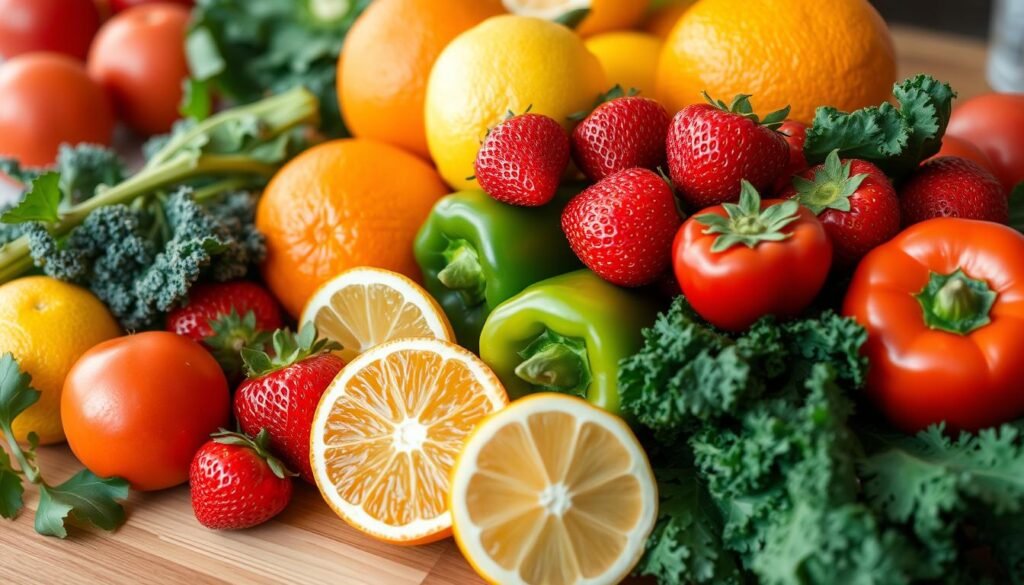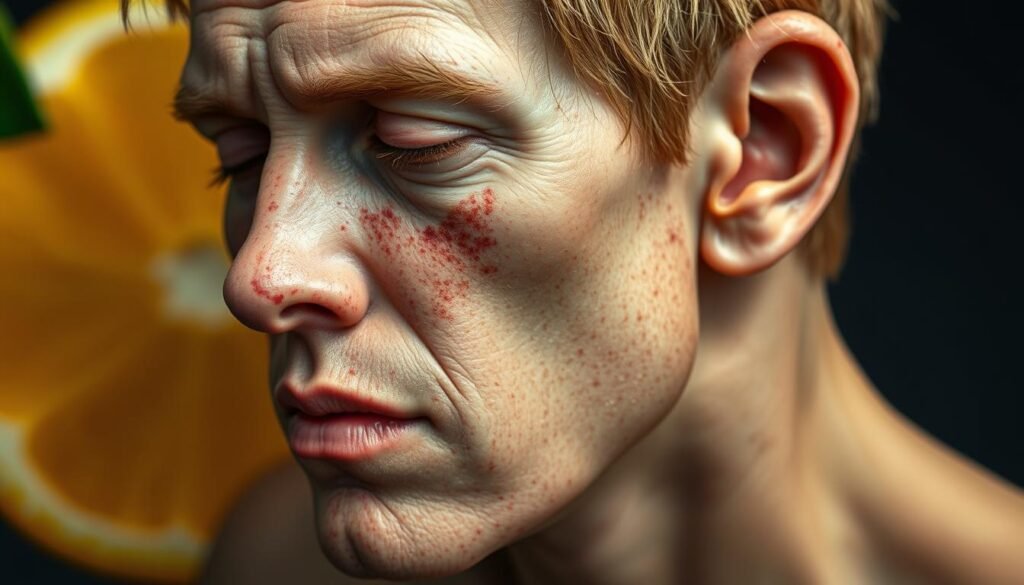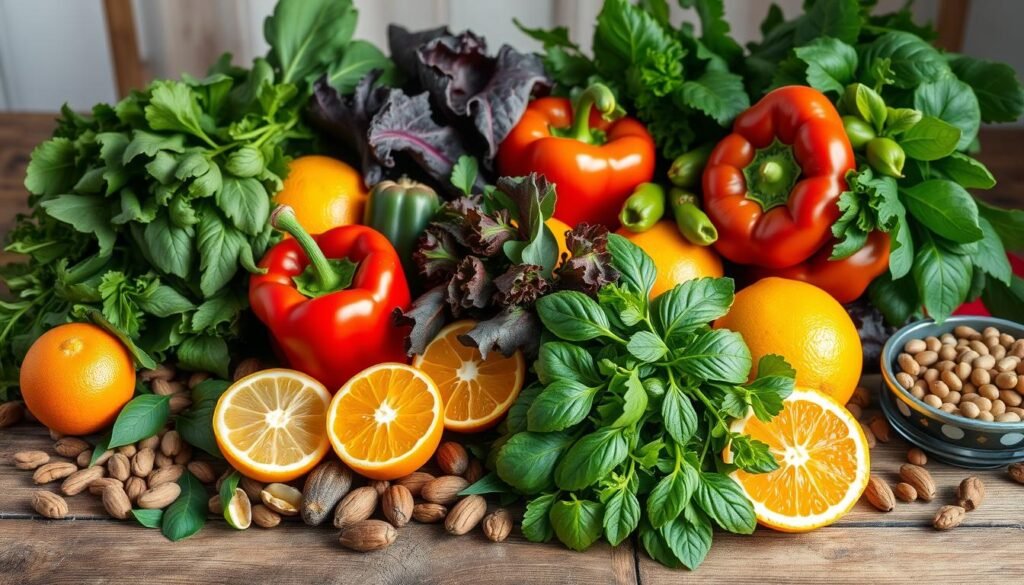Have you ever thought about the power of a simple vitamin? Vitamin C can greatly boost your body’s fight against fatigue. It helps keep your energy up. The link between Vitamin C and anemia is quite amazing. Anemia makes people feel tired because they don’t have enough healthy red blood cells. But, Vitamin C in your diet is key to taking in more iron, which you need for strong health. Let’s explore how Vitamin C helps with anemia and leads to better health.
Key Takeaways
- Vitamin C significantly enhances iron absorption, vital for anemia treatment.
- Anemia can lead to serious health issues when left untreated.
- A balanced diet rich in Vitamin C can improve overall health.
- Understanding the causes of anemia is essential for effective management.
- Incorporating Vitamin C sources into meals can help alleviate fatigue.
- Healthcare providers recommend Vitamin C for those with iron deficiency anemia.
Understanding Anemia and Its Causes
Anemia is a common condition that affects many people around the world. It happens due to many different reasons. Knowing the signs of anemia is vital for catching it early and treating it effectively.
There are many things that cause anemia. These include not getting enough nutrients and long-term diseases.
Types of Anemia
Anemia comes in different types, each with its own causes and health effects. Here are the most common types:
- Iron-deficiency anemia: This type is due to not having enough iron to make hemoglobin, which is crucial for red blood cells.
- Pernicious anemia: It happens when the body can’t take in vitamin B12 properly. This is often because of an immune system issue with the stomach.
- Sickle cell anemia: A genetic condition that makes red blood cells change into a sickle shape. This leads to several health issues.
- Hemolytic anemia: This type occurs when red blood cells are destroyed too early. This can be caused by immune system problems or infections.
Common Symptoms of Anemia
Knowing the signs of anemia is key for timely medical help. Some usual symptoms are:
- Fatigue or feeling very tired
- Pale skin
- Weakness, especially after being active
- Having trouble breathing and feeling your heart beat fast
To prevent further health issues, it’s important to understand anemia’s causes. For more details on this subject, check this resource. Recognizing and treating anemia early can really help improve someone’s life.
The Role of Iron in the Body
Iron is vital for our health. It makes hemoglobin, a key protein in red blood cells. Hemoglobin carries oxygen all over the body. This boosts our energy and immune system, showing how important iron is every day.
Importance of Iron for Health
Iron’s role is critical for our bodily functions. It helps with:
- Oxygen transport to vital organs
- Energy production at the cellular level
- Support for a robust immune system
- Facilitation of cognitive functions and concentration
To keep our health up, absorbing iron well is crucial. Eating foods rich in iron with vitamin C can improve this. Find out more about iron and vitamin C here.
How Iron Deficiency Affects Health
Not having enough iron can cause health problems, like iron-deficiency anemia. This leads to feeling tired, weak, and having a pale look. If it lasts long, it might harm brain function, physical ability, and our immune defenses. Knowing this shows us why keeping iron levels right is essential for staying healthy and full of life.
Vitamin C and Anemia: Enhancing Iron Absorption
Vitamin C plays a key role in fighting anemia. It does this by helping the body absorb iron. Iron comes from foods, especially plants, but isn’t easily absorbed on its own. Vitamin C changes iron into a form that’s easier for the gut to take in. This process is very important for those who can’t eat certain foods.
Eating foods high in Vitamin C can help your body more from iron sources. Foods like oranges, strawberries, and bell peppers are great for this. Adding Vitamin C-rich foods to iron-rich meals boosts your health. Knowing how Vitamin C helps can be key for those with anemia.
The Chemistry of Vitamin C and Iron Absorption
Vitamin C and iron have a unique bond that helps our body absorb iron more efficiently. Ascorbic acid, Vitamin C’s active form, changes ferric iron (Fe3+) into ferrous iron (Fe2+). This form is easier for our guts to absorb. Knowing how this works shows us why Vitamin C is key for those who want to up their iron levels.
How Vitamin C Aids Iron Absorption
Ascorbic acid boosts iron absorption in a few ways:
- Converts ferric iron to ferrous iron, increasing solubility and absorption efficiency.
- Enhances the transport of iron across intestinal cells.
- Combats inhibitory factors in food, allowing for better iron utilization.
If you’re low on iron or have anemia, eat Vitamin C-rich foods with your meals. This can really help your body grab more iron from what you eat.
Factors Affecting Iron Absorption
Even though Vitamin C is a big help, other factors also play a part in how well we absorb iron:
- The type of iron consumed: Heme iron from animal sources is absorbed more efficiently than non-heme iron from plant sources.
- Dietary components: Some foods and substances, such as calcium and tannins in tea and coffee, can inhibit iron absorption.
- Overall health status: Conditions like celiac disease or inflammatory bowel disease can impair absorption.
- Meal composition: Consuming iron-rich foods alongside foods high in Vitamin C creates a favorable environment for absorption.
Benefits of Vitamin C Beyond Iron Absorption
Vitamin C is more than just an iron helper. It’s a key nutrient that guards our cells against damage. It fights off oxidative stress and inflammation. This shows how vital Vitamin C is for our bodies’ various needs.
Antioxidant Properties of Vitamin C
Vitamin C is a strong antioxidant. It fights harmful free radicals and lessens oxidative stress. This is crucial for keeping cells healthy and preventing chronic diseases.
By eating foods rich in Vitamin C, we can protect against cell damage. This antioxidant power supports our overall health. It is our first defense against many health problems.
Vitamin C and Immune Function
Vitamin C strengthens our immune system. It helps produce and improve white blood cells, which protect us from infections. With enough Vitamin C, our immune system works better, making us less likely to get sick.
Studies show that people with good Vitamin C intake get fewer infections. This underscores Vitamin C’s importance in our health. For more detailed insights, visit this resource.
Foods Rich in Vitamin C for Optimal Health
It’s key to add Vitamin C rich foods to your diet. They’re great for your overall health, especially for making iron easier to absorb. Let’s look at foods packed with Vitamin C, such as citrus fruits and vegetables.
Citrus Fruits and Their Benefits
Citrus fruits stand out for their high Vitamin C levels. They not only make meals tastier but also boost your health. They help enhance your immune system and make your skin look better. Some top citrus fruits loaded with Vitamin C are:
- Oranges
- Grapefruits
- Lemons
- Limes
Vegetables High in Vitamin C
Loads of vegetables also offer plenty of Vitamin C. They give you the nutrients needed for better iron absorption and overall health. Here are some top veggies rich in Vitamin C:
- Bell Peppers
- Broccoli
- Kale
- Brussels Sprouts

| Food | Vitamin C Content (per 100g) |
|---|---|
| Oranges | 53.2 mg |
| Grapefruits | 38.9 mg |
| Bell Peppers | 80.3 mg |
| Broccoli | 89.2 mg |
Vitamin C Supplements: Do They Help?
Vitamin C supplements are very popular for their health benefits. They are especially good at improving how well we absorb iron. Knowing about the different kinds of Vitamin C supplements helps people choose the right one for their diet.
Types of Vitamin C Supplements Available
There are many Vitamin C supplements to choose from. Some common types are:
- Ascorbic Acid: This is the most common and affordable Vitamin C type.
- Sodium Ascorbate: It’s easier on the stomach, perfect for those sensitive.
- Calcium Ascorbate: This form adds calcium to the vitamin C, offering more minerals.
- Liposomal Vitamin C: This type is wrapped in liposomes for better absorption.
Considerations Before Starting Supplements
There are things to consider before starting Vitamin C supplements:
- It’s smart to talk with a doctor first to get the right dosage.
- Knowing about possible side effects, like stomach issues, is important.
- Checking how much Vitamin C you get from food can show if you need supplements.
Recognizing Vitamin C Deficiency
Vitamin C deficiency can lead to serious health problems. Knowing the common symptoms is key for good health. If you catch these signs early, you can change your diet or add supplements. This may stop worse problems from happening.
Common Symptoms to Watch For
Those low on Vitamin C might see various common symptoms. Spotting these early helps manage your health:
- Fatigue and lethargy
- Skin issues, like dryness and easy bruising
- Getting sick often and slow healing
- Joint pain or swelling
- Gum problems, such as bleeding or recession
Keep an eye on your eating habits to avoid missing important vitamins. Adding more Vitamin C to your diet is a big benefit to your health.

Combining Iron and Vitamin C in Your Diet
Mixing iron with Vitamin C in meals is smart. It helps people get the most out of these nutrients, leading to better health.
Best Practices for Consumption
Here are the best ways to get these nutrients:
- Pair iron-rich foods with Vitamin C sources: Try having orange juice with iron-fortified cereals. It’s a tasty and smart mix.
- Incorporate bell peppers into salads: Putting bell peppers in spinach salads boosts Vitamin C and adds great flavor.
- Choose fruits high in Vitamin C: Eating strawberries or kiwi with iron-rich meals helps your body absorb iron better.
- Use citrus dressings: Adding lemon or lime juice to dressings tastes great with iron-rich grains like quinoa.
- Opt for smoothies: Making smoothies with leafy greens and Vitamin C-rich fruits is a yummy way to up your iron absorption.
Effective Anemia Treatments Involving Vitamin C
Anemia treatments focus on the root cause. Vitamin C is key in absorbing iron. Making dietary changes is thus crucial for those with anemia. Eating foods high in both nutrients can greatly help.
Dietary Changes for Anemia Patients
Changing what you eat can have a big impact on anemia. Here are foods that can help improve your health:
- Citrus fruits like oranges and grapefruits go well with iron-packed foods such as spinach and lentils.
- Tomatoes and bell peppers can also be paired with these iron sources.
- Adding strawberries to your iron-fortified breakfast cereal can be beneficial.
- Try broccoli with grilled chicken or tofu for an iron-rich dish.
These changes in your diet can boost iron levels. This can lead to better health for anemia patients.
Consulting Healthcare Providers for Treatment Options
Each anemia case is different. It’s important to talk to healthcare providers. They can guide you on the best treatment plans. They might suggest specific diet plans or supplements. This ensures patients get proper care.

Research Studies on Vitamin C and Anemia
Recent Vitamin C and Anemia research studies have shown impressive results. They’ve discovered that Vitamin C significantly boosts the absorption of iron. This has helped people with anemia by improving their hemoglobin levels.
A detailed study focused on the effect of Vitamin C on those with anemia. It noticed an increase in serum iron levels. This proves that Vitamin C is key in helping the body use iron efficiently. Another important finding came from a meta-analysis of various studies. It confirmed that more Vitamin C leads to better iron absorption.
The findings from these Vitamin C and Anemia research studies lay a strong base of knowledge. They highlight the crucial role of Vitamin C in fighting anemia. It’s important to keep researching. This way, we can learn the best ways to use supplements and food to improve health.
Conclusion
Vitamin C and Anemia have a key link. It’s vital for defeating this health issue. Vitamin C helps the body absorb iron better. This is crucial for those with anemia. Besides aiding iron uptake, Vitamin C also fights off infections and boosts overall health.
Eating right is crucial. Foods like citrus fruits, bell peppers, and leafy greens are rich in Vitamin C. They can help improve iron absorption and ease anemia symptoms. It’s also wise to talk to doctors about anemia treatment. They can guide on diet changes and supplements for better health.
Knowing how Vitamin C and iron work together is the first step to better health. Making smart food choices and getting professional advice can help fight anemia. Let’s not underestimate Vitamin C’s role in our journey to wellness.